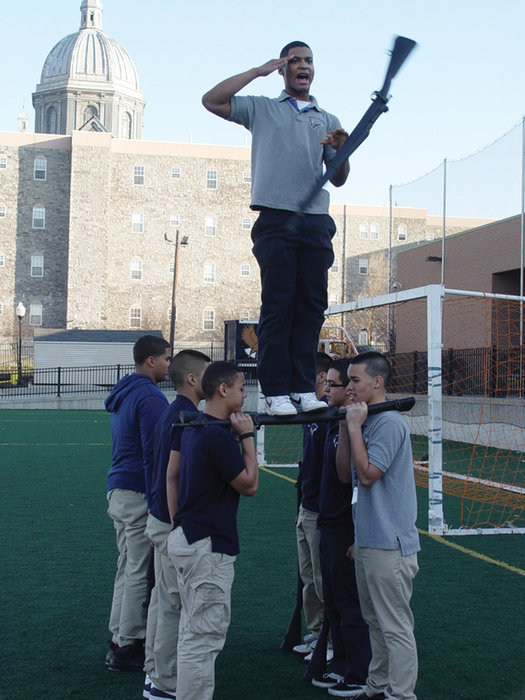High school senior Noel Velacquez came to Union City from the Dominican Republic at age 14. He spoke no English, and he had never heard of the Marine Corps Junior Reserve Officer Training Corps program (ROTC) before. But when the school made him aware of the program, he decided to give it a chance.
“Even though I didn’t understand what people were saying,” Velacquez said, “I understood that I liked it.”
Four years later, he is the group’s commanding officer, will be graduating at the top of his class in June, and is in the process of applying to Penn State’s nuclear engineering program.
Students in the Jr. ROTC program have the opportunity to compete in drill competitions. They are judged on many levels of performance, including physical fitness, color guard, unarmed and armed platoon. This year, based on cumulative high scores they’ve achieved during five local and regional competitions throughout the year, they have been invited to compete on the national level in Daytona Beach.
“I love the responsibility it takes to be a leader.” –Stephanie Franco
____________
Noel succeeded
Of the 25 seniors enrolled in the city’s Jr. ROTC program, only two have plans to enlist in the military. The national rate of students in the program who go on to enlist is only around one percent, fellow Gunnery Sergeant Miguel Quiñones said.
“This is not a recruiting station,” Quiñones explained. “These teenagers come to us with low motivation and low self esteem. They’re looking for a place to belong, and here they find a family.”
Though the city’s Jr. ROTC students have been invited to compete in the national competition in Fla. late April, they require more funding in order to attend.
“Our students have been very focused and committed,” Reyes said. “They’ve hit the drills real hard, and they’ve earned their spot.”
‘I wanna reach the top.’
“Ever since I was little, I thought the Marines were cool, but I didn’t know how to get in,” Freshman Jr. ROTC Cadet Robert Diaz said. When he first saw the group practicing drills, “I got all happy.”
The first thing Diaz did when he arrived at Jose Martí Freshman Academy was sign up for the elective. He is one of 140 freshman in the program (total enrollees is around 250), with a rate of attrition of about four to one.
“We have a 25 percent retention rate, while the average school club’s percentage is 10,” Quiñones said. He believes a reason for this is the deep friendships students make while in the program.
Diaz, who has only been a cadet for half a year, is already a case in point. “My favorite thing about the Jr. ROTC is the strong bond we have,” he said. “We stand up for each other, and everyone wants to be here.”
As for his future in the program, Diaz said, “I want to go the highest I can go. I wanna’ reach the top.”
Civil service vs. military service
Contrary to common belief, the Jr. ROTC is not a teenage military training program, according to Reyes. “We are a program that teaches leadership, citizenship, and community responsibility,” he said. “Imagine seeing some of these inner city kids stay off the streets, stay off drugs, help their community, help each other, and go to college.”
Female cadets account for half of enrollees. During color guard practice, Cadet Sergeant and junior Stephanie Franco, a three-year veteran of the program, stood on the field and drilled fellow female cadets.
Franco’s father was a military man who passed away seven months prior, and she said her Jr. ROTC classmates have helped her pull through. “I love the responsibility it takes to be a leader,” Franco said, “but I love how we’re like a family, too.”
She has joined her classmates on many of the near-45 community service events they have volunteered for throughout the year.
Forward thinking
Reyes reported that most seniors in the program end up going to college after graduation, a statistic that has nothing to do with military scholarships or incentives. Students take military classes – like uniform instruction and patriotism – but are not pressured to enlist. Their parents must sign a consent form before they are allowed to enroll in the elective.
“We do not discuss joining the armed forces unless the kids want to talk about it,” Quiñones said. As for why so many Jr. ROTC students move on to college, he continued, “We focus on what they need to do in order to move on successfully to a career they enjoy, and we emphasize the importance of college in that process.”
To help the students get to Daytona Beach this year, send donations to the Jr.ROTC at Jose Martí Freshman Academy, care of Gunnery Sgt. Caonabo Reyes, 1800 Summit Ave., Union City, N.J., 07087. For more information, call Reyes at (201) 835-2640, or Quiñones at (646) 894-8442.
Gennarose Pope may be reached at gpope@hudsonreporter.com
